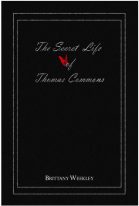TWO GAY STORIES FROM 18TH CENTURY ENGLAND
Weekley, Brittany. The Secret Life of Thomas Commons. Byron Center, MI: Dream Big Publishing, c2016. 225 p. ISBN 978-0-692-62314-5.
Mansfield, Wayne. Across the Sea. Glen Allen, VA: JMS Books LLC, c2016. 135 p. pdf edition. ISBN 978-1634861-1243.
 I am reviewing these two historical novels of gay relationships from the late 18th century into the early 19th century together because they are so different. They both begin in England with its repressive anti-gay laws and attitudes. The Weekley novel concerns two upper class young men who fall in love. Thomas resists as best he can but eventually succumbs to the overwhelming persuasive power of Wesley, and indeed they do fall in love with each other. But a jealous brother of Wesley accuses them of the despicable crime of sodomy. Thomas’ rich autocratic father gets them off but only on the condition that they separate and never see each other again. Wesley leaves and Thomas mourns for him the rest of his life until he learns of Wesley’s death in Boston. Earlier he marries a woman he despises, arranged by his father, but he dearly loves his three children. As soon as he learns that Wesley has died in Boston, he goes there and brings back Wesley’s possessions.
I am reviewing these two historical novels of gay relationships from the late 18th century into the early 19th century together because they are so different. They both begin in England with its repressive anti-gay laws and attitudes. The Weekley novel concerns two upper class young men who fall in love. Thomas resists as best he can but eventually succumbs to the overwhelming persuasive power of Wesley, and indeed they do fall in love with each other. But a jealous brother of Wesley accuses them of the despicable crime of sodomy. Thomas’ rich autocratic father gets them off but only on the condition that they separate and never see each other again. Wesley leaves and Thomas mourns for him the rest of his life until he learns of Wesley’s death in Boston. Earlier he marries a woman he despises, arranged by his father, but he dearly loves his three children. As soon as he learns that Wesley has died in Boston, he goes there and brings back Wesley’s possessions.
More or less at the same time, Jacob, a young man of 23 convicted of stealing apples for his starving siblings, and  Peter, in his 40s, convicted for a similar crime, find themselves on a long voyage to the English penal colony in Australia. During this voyage they become friends and lovers. Most of the other convicts accept, even applaud, their relationship, but some hate it and try to attack the young Jacob. But Peter and other men protect him. They both are assigned to settlers as indentured servants (slaves) for 7 years. Jacob is lucky to have a gay master, who falls in love with him, although Jacob belongs to Peter in his heart and mind. Only at the end of their seven years do they discover that they are rather close to each other and meet again. They set out to live happily ever after together on 40 acres of land grants. There is lots of sex, but described respectfully. There is sex in the Weekley novel too, but it is only hinted at.
Peter, in his 40s, convicted for a similar crime, find themselves on a long voyage to the English penal colony in Australia. During this voyage they become friends and lovers. Most of the other convicts accept, even applaud, their relationship, but some hate it and try to attack the young Jacob. But Peter and other men protect him. They both are assigned to settlers as indentured servants (slaves) for 7 years. Jacob is lucky to have a gay master, who falls in love with him, although Jacob belongs to Peter in his heart and mind. Only at the end of their seven years do they discover that they are rather close to each other and meet again. They set out to live happily ever after together on 40 acres of land grants. There is lots of sex, but described respectfully. There is sex in the Weekley novel too, but it is only hinted at.
Both novels are told in the third person. The Weekley novel has a few quirks. It suffers from weak proof reading, so that there are occasional missing words, as in “Will be attending our wedding, sir?” The “you” is missing. The two men are excessively formal, addressing each other only as Mr. Commons and Mr. Ashfield until they fall in love. The author includes a bibliography of historical sources, so I assume this is in accordance to upper-class practice of the time. But surely they would understand that the direct object after a preposition is “me”, not “I”. This grammatical mistake happens over and over in the novel. Nevertheless this tragic tale is well and movingly told with compassion and understanding. The language in the Australian novel is much more conventional and straight forward, also convincingly told.
I recommend both novels for collections that desire good gay-themed historical novels, and also for readers who enjoy them. Read them together, became the positive and hopeful Across the Sea offsets the unremitting tragedy and sadness of The Secret Life.
James Doig Anderson
Professor Emeritus of Library and Information Science, Rutgers University
